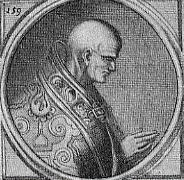Anastasius, Bishop, and servant of such as are
servants of God, to his beloved son Raymond, Master of the Hospital in the
city of Jerusalem, and to his brethren, both present and to come,
professed forever in the religious life, health and the apostolic
blessing. The religion of the Christian Faith piously believes and truly
confesses that while Jesus Christ, Our Lord, was rich in all things, He
became a poor man for our sake. Wherefore He promises those who would
imitate Him rewards of timely consolation: "Blessed are the poor, for
theirs is the Kingdom of Heaven." Likewise the Father of orphans and
Refuge of the poor exhorting us to be hospitable and generous says in the
Gospel: "What you have done for one of my least brethren, you have done
for Me." And to prove further the excellence of such goodness, He assures
us that He will give a reward even for a cup of cold water. We, therefore,
whose express duty it is to provide with paternal care for those near and
far, embrace you in your devotion and bestow Our favors according as they
are asked. And following the example of Our predecessors of happy memory,
Innocent, Celestine, Lucius, Eugene, all Roman Pontiffs, We take under the
protection of Saint Peter the Hospital and the home at the Holy City of
Jerusalem, and We protect with the privilege of the Holy See all persons
and property pertaining to it.
We decree that whatever possessions or goods that
have been acquired by the hospital to sustain the needs of pilgrims and
the poor in the parishes of the Church at Jerusalem or of other churches,
whether they have been acquired by purchase through the watchful care of
those in charge, or bestowed by certain individuals, either through a
future grant from kings or princes because of the largess of God, or
acquired by some other just means; whatever has been lawfully granted to
the parish priests by the venerable brethren of the See of Jerusalem,
whether for themselves or for your successors, and to the brethren who
care for the pilgrims, We command these (possessions) be preserved
peacefully and in their entirety.
If any real estate is given to the same venerable
House through someone's devotion, you may build houses there, and erect
churches and make cemeteries according to the need of those who live
there, as long as there do not exist neighboring abbeys that might be
disturbed by this. Moreover, when lands which have been given to you are
conferred with a legal title, you may have the faculty and the license to
found oratories there and to make cemeteries in accordance with the needs
of pilgrims and of those brethren only, who dine at your table. We decree,
therefore, that the receptors of your brotherhoods (x) or collections
without detriment to their masters shall stand under the protection of
Saint Peter and of Us, and wherever they shall travel through the world,
they shall have peace.
We decree likewise that whoever has been received in
your brotherhood, if by chance the church to which he belongs has been
prohibited from holding divine services, and he should happen to die, he
shall not be denied a church burial, unless he has been excommunicated or
under interdict by name.
Besides, if any of your brothers who have been sent
by you to receive these same brotherhoods and collections shall arrive at
any city, town, or village, if by chance that place is under interdict
from divine services, out of reverence for Almighty God the church shall
be opened once in the year at their joyful coming, and when the
excommunicated have been turned out, divine services shall there be
celebrated.
And since all of your goods are to be expended for
the sustenance of the pilgrims and the poor, and they are not to be given
to any other use, We decree that no cleric or layman may in any way
presume to exact tithes from you for the gain you reap from your labors.
We decree that no bishop will be permitted to pronounce a sentence of
interdiction, suspension, or excommunication upon the churches under your
care. Nevertheless, if a general interdict has been pronounced upon these
places, divine services may be celebrated simply, as long as the
excommunicated are turned out along with those under interdict by name,
the doors are closed, and no bells are rung.
Moreover, so that nothing will be lacking to you for
the fullness of salvation and the care of your souls, and that the
sacraments of the church and divine services may be conveniently arranged
for you and for Christ's poor, We decree that you may take to yourselves
clerics and priests no matter whence their origin as long as you have
proof of their integrity and their ordination, to the best of your
knowledge through letters and consistent testimony of witnesses; and you
may keep them with you either at your principal establishment or in those
subject to you; provided that they are not under obligation to some
locality or diocese, and that they are not considered harmful to the
profession and the Order.
And if the bishops by chance are unwilling to yield
these men to you, you nevertheless will have the right to take them in and
retain them through the authority of the Holy Roman Church. These same
clerics shall be subject to no person outside your chapter with the
exception of the Roman Pontiff.
We in no way impart the power to you of taking free
laymen into your community for service with the poor without objection
from someone.
We refuse permission to return to the world to your
brethren who once in, and having been received into your community, have
made their profession and taken the religious habit. Nor would it be right
for anyone of them after making his profession and assuming the cross of
the Lord and taking the habit of your Order, to cast it off.
Nor should anyone move to another place, whether it
be a major or a minor monastery, without consulting the brethren or the
master of the place, and if the brethren should be unwilling, he should
not move there even though a license has been obtained. And no license
shall be given to any ecclesiastic or secular authority to take them in or
keep them.
Consecrations of altars or basilicas, ordinations of
clerics who have been promoted to Holy Orders, and other church sacraments
are in the hands of the bishop of the diocese; if indeed he is a Catholic
and has favor and communion with the Apostolic See, he shall freely and
willingly give you these services with no irregularity towards you;
otherwise you are permitted to approach a Catholic bishop of your choice
who is indisputably supported by Our authority to grant the requests you
make.
And at your death, since you are the provider and
prefect of the place, no one will be put in charge through deception,
craft, or violence, but only he whom the brethren elect according to the
will of God.
Furthermore, the legacies or possessions here or
beyond the sea, in Asia or Europe, which the hospital now rightly
possesses or will be able to obtain through reasonable means, we confirm
for you in behalf of your efforts in the hospital work, and through you
for the said hospital. Let no one have the rashness to disturb the
aforementioned hospital, or take away its possessions, or retain anything
that has been stolen from it, to weaken it, or to harass it with any
violence; but let everything be preserved whole and entire, which has been
given for direction and sustenance and shall be provided for in the future
for any purpose with due respect to the authority of the Apostolic See and
the canonical justice of the bishop of the diocese.
And if in the future any ecclesiastic or secular
person knowing this Our constitution attempts the rashness of going
against it after the third warning unless he has made sufficient amends
for the defection, he shall be relieved of the dignity of his power and
office, and he shall learn that he is liable to divine justice for
perpetrating the offense, and he shall be deprived of the most sacred Body
and Blood of Our Lord and Our God and Redeemer Jesus Christ, and at the
last judgment he shall be subject to the severest vengeance. But to all
who preserve the rights of this place may the peace of Our Lord Jesus
Christ come in so far as they here are receiving the fruit of their good
actions, and when they meet the strict Judge may the reward of eternal
peace be theirs. Amen, amen, amen.
Given at the Lateran through the hand of Roland,
cardinal priest of the Holy Roman Church and chancellor, on the 21st day
of October, in the third indiction, the year of the Incarnation of Our
Lord 1154, during the second year of the pontificate of Pope Anastasius
IV.
 The Christian faith can never be separated from the soil of sacred events, from the choice made by God, who wanted to speak to us, to become man, to die and rise again, in a particular place and at a particular time. “Always” can only come from “once
for all”. The Church does not pray in
some kind of mythical omnitemporality. She cannot forsake her roots.
She
recognizes the true utterance of God precisely in the concreteness of
its
history, in time and place: to these God ties us, and by these we are
all tied
together. The diachronic aspect, praying with the Fathers and the
apostles, is
part of what we mean by rite, but it also includes a local
aspect, extending
from Jerusalem to Antioch, Rome, Alexandria, and Constantinople. Rites
are not,
therefore, just the products of inculturation, however much
they may have
incorporated elements from different cultures. They are forms of the
apostolic
Tradition and of its unfolding in the great places of the
Tradition
The Christian faith can never be separated from the soil of sacred events, from the choice made by God, who wanted to speak to us, to become man, to die and rise again, in a particular place and at a particular time. “Always” can only come from “once
for all”. The Church does not pray in
some kind of mythical omnitemporality. She cannot forsake her roots.
She
recognizes the true utterance of God precisely in the concreteness of
its
history, in time and place: to these God ties us, and by these we are
all tied
together. The diachronic aspect, praying with the Fathers and the
apostles, is
part of what we mean by rite, but it also includes a local
aspect, extending
from Jerusalem to Antioch, Rome, Alexandria, and Constantinople. Rites
are not,
therefore, just the products of inculturation, however much
they may have
incorporated elements from different cultures. They are forms of the
apostolic
Tradition and of its unfolding in the great places of the
Tradition 








